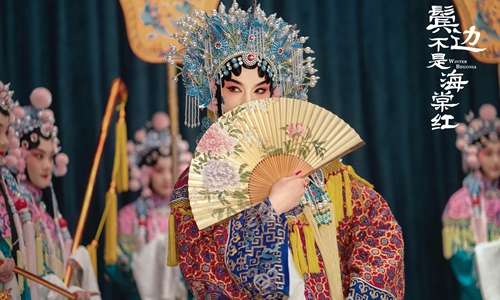LIFE / HOMES & GARDENS
Chinese web adaptation of BL online novel promotes China’s traditional Peking Opera

Shang Xirui, lead role of the drama. Photo: Courtesy of iQiyi
Chinese web drama Winter Begonia, an adaptation of a popular Boys' Love web novel, has earned high marks among TV viewers in China for its efforts in promoting the traditional culture of Peking Opera.The series, starring Chinese actors Yin Zheng and Huang Xiaoming, tells the story of a well-known Peking Opera performer and a successful entrepreneur as they try to rebuild a famous opera house in 1930's Beijing. Debuting on March 20, the first 12 episodes of the 49-episode series has earned a 7.3/10 on Chinese media review site Douban.
In the 1930s, Chinese opera performer Shang Xirui rises to fame through his excellent skills to become the hottest new Peking Opera performer in the capital. In order to maintain his position in the populated city and fulfill his promise to keep this art form alive, he devotes himself to his art.
Cheng Fengtai is a wealthy businessman who has never seen a Peking Opera before. When he sees Shang perform by chance one day, he is deeply moved and becomes determined to befriend the opera star. Under the influence of Shang, Cheng grows to admire the art form almost as much as he admires Shang.
"Producers of Winter Begonia places Peking Opera center stage as it tells its story to audiences," Shi Wenxue, a cultural critic and a teacher at the Beijing Film Academy, told the Global Times on Wednesday.
"For example, the first two episodes introduce the costume culture of the opera through the research Shang carries out and carefully portrays opera performances on stage, including every twinkle and smile."
Additionally, many facts and trivia about Peking Opera appears as notes on screen so audiences may learn more as they watch each episode.
For instance, when Shang mentions Yutangchun (Lit: Jade Hall Spring), one of the classic works of Peking Opera, an introduction to the work is shown on the screen: It is about a love affair between Su San, a famous prostitute, and Wang Jinglong, son of a senior official. When Shang performs "Baihua Pavillion," an introduction reveals that it is one of representative works of Mei Lanfang, the late master of Peking Opera.
"I decided to watch the drama because I was touched by the original BL story, but after watching it, I learned a lot about the charm of our country's splendid traditional opera culture," a 26-year-old viewer living in Beijing told the Global Times.
She noted that many young people like herself do not have enough patience to admire the ancient and traditional art form at real life venues, so it is great how the drama uses modern storytelling methods to draw them into the culture.
"We are distracted by other modern and imported cultural works. This method combining trending themes with traditional culture is a great way to attract more young people."
Shi noted that such a method is conducive to the spread of traditional culture among young people, and from the perspective of plot design and character situation, it has a lot of echoes with the present, so that young audiences can feel the evolution and inheritance of Peking Opera and traditional culture.
British "heritage films" in the 1980s that won a lot of international awards and South Korean TV series including Dae Janggeum are all successful examples of integrating traditional culture into popular film and television works.
He added that other similar shows overseas can learn from the show's experience. For instance, BL dramas from Thailand have been gaining in popularity recently and should provide an excellent platform to show off the country's traditional culture.





